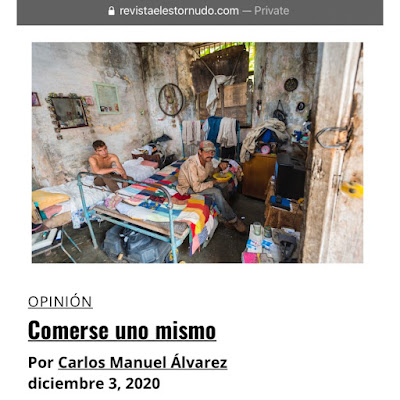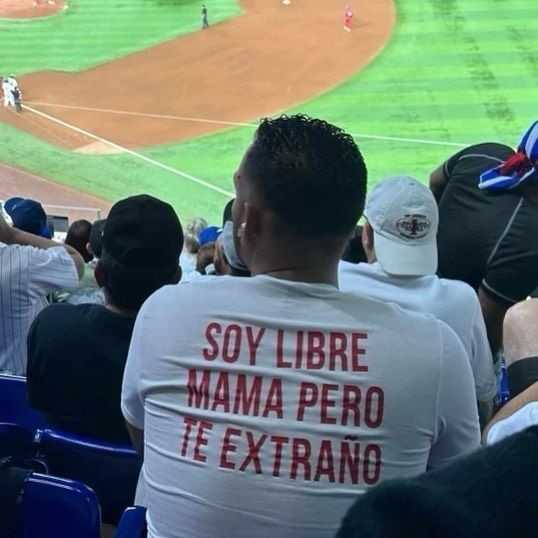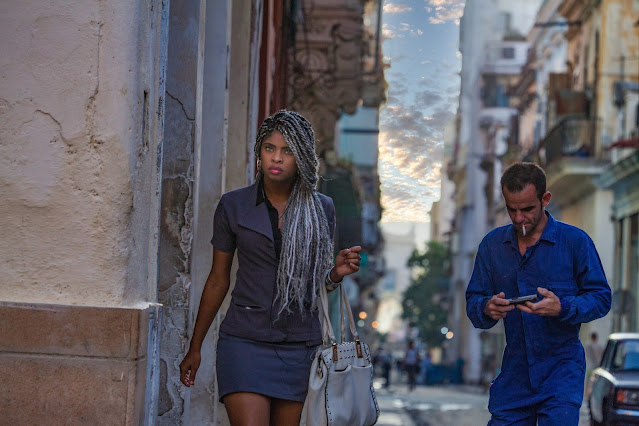To Eat Oneself - An English translation of "Comerse un mismo" by Carlos Manuel Álvarez
His stories, written in Spanish, including "Poemas de San Isidro," "Denis Solís y la culpa cubana," this one, and more are published online at https://revistaelestornudo.com and are conveniently embedded at the end of this post.
What Cubans look for in food is ultimately not food. The long lines they make to buy a piece of chicken or a few rows of eggs are not in the end long lines to buy a piece of chicken or a few rows of eggs. The reason why the queues never end is not because the food or the product that has miraculously appeared that day is scarce and everyone rushes out to buy it. What is scarce is something else, encrypted, that people sense.
People take their piece of chicken and their rows of eggs after hours of work in the trapiche out of nowhere and they look strangely at what the vendor, weak and tired, has put in their weak and tired hands, and people say to themselves: "This is what they were selling, but this is not what I came to buy, even though I have convinced myself that this is what I came to buy."
Then the people come to your house and manage the piece of chicken and the rows of eggs. They always eat a little, as far as they can go, appeasing the animal's hunger, making it docile, but without ever being able to kill it. People eat to anesthetize something they can't cure. Food in Cuba is like a medicine that does not heal, but relieves for a while.
Is it fair that we pay that price, for why should we have to ask the animal that is hunger to calm down with food? If we know that this will never happen.
Once again we have to go out to the street, to buy what we have convinced ourselves that we are going out to buy, until the faint and tired seller puts the product in our faint and tired hands and we realize for the umpteenth time that what they were selling us was not exactly what we had gone to buy. There are people who have spent their entire lives, day by day, realizing this.
But this realization must be understood as a notion in the mist, something that is suspected, that has not yet been completely drawn and that always remains in a state of sleep, between melting and fleeting. Better this way, we say, before the beast of hunger launches the final blow at us.
The beast of hunger roars at home and you have to inject it with the soothing food. Even if you strain your ears, you can hear throughout Cuba the dull roar of all the synchronized beasts of hunger, singing in unison their melody of minimal terror, kidnapped in the cages of faint and tired bodies. Imperceptible misfortune, intimate evidence. Bodies, furthermore, from which hunger does not want to escape either.
His kidnapping is also a voluntary stay, because those hungers were incubated there, they grew up there, they don't want to and wouldn't know how to go to another place. They know these anatomies just as heroes know their countries and dictators know their peoples. They have molded the figure of those bodies just as heroes mold the figures of their homelands and dictators the figures of their peoples.
In An Artist of Hunger, the Kafka story that may have disturbed me the longest after reading it, the fasting man is dying inside his circus cage and tells everyone to forgive him, but only the inspector listens, glued to the fence (who, if not the inspector, is going to listen?). "Without a doubt," he says, "we all forgive you."
The fasting person had wanted all his life to be admired for his resistance to not eating anything, and when the inspector answers that, in fact, they have admired him, the fasting person replies that they should not have done it, because fasting was forced on him, he could not help it. Why's that? Well, because he could never find food that he liked. "If I had found her, you can believe it, I would not have paid any compliments and I would have had enough like you and like everyone else," were the fasting man's last words.
The San Isidro hunger strikers are a bit like this fasting person. They have searched all over Cuba for a meal that they liked, they have wanted to get fed full like the others, but they have not been able to find it anywhere. And lo and behold, since freedom was only found in them, they began to eat themselves.










Comments
Post a Comment
Please feel free to share your #soscuba story here. If you would like to be featured on this page, please Submit Your Story online at cubanswithwings.com